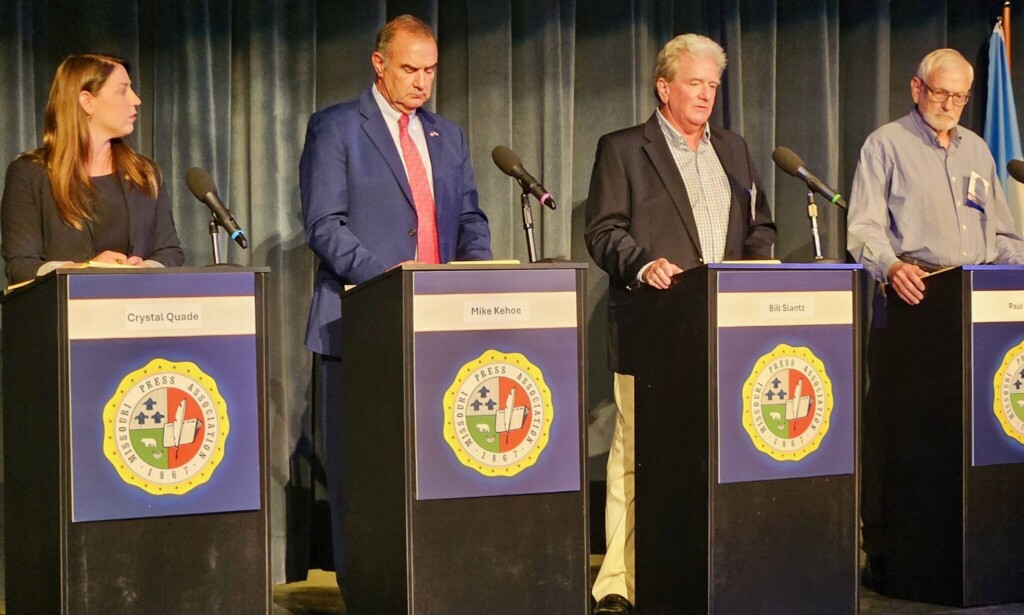Missouri’s gubernatorial debate explored four wildly different perspectives for 2025 and beyond
Missouri gubernatorial candidates met for forums Friday, Sept. 20, in Springfield, sponsored by the Missouri Press Association. Present onstage were Republican and current Lieutenant Governor Mike Kehoe, Democrat and current House minority leader Crystal Quade, libertarian and business owner Bill Slantz, and Green Party candidate Paul Lehmann, a retired farmer and minister.
Here are the takeaways from the debate:
Abortion and Amendment 3
Kehoe expressed his hard opposition to Amendment 3, the proposed constitutional amendment that will enshrine reproductive rights into the Missouri Constitution if passed by voters on Nov. 6. He said that it could be one of the most harmful amendments to ever be placed on the ballot, claiming that it doesn’t provide adequate protections for women, stating the amendment steps “way too far, it’s very extreme.” Kehoe said that we should support abortion and pregnancy resource centers instead.
“I will do all I can to see that Amendment 3 is defeated,” Kehoe said.
Quade first identified herself as pro-choice in her opening remarks and reaffirmed her position when asked if she supported Amendment 3, saying that she would carry out the will of over 380,000 Missourians who signed the petition for the amendment in less than three months.
“The law that we have in Missouri right now is the most extreme in the entire country, without exceptions for rape or incest, and I personally have received phone calls from women who have gone to the doctor’s office during an active miscarrying situation and sent home being told that they’re not close enough to death yet, Quade said.
“Our doctors are scared to do their jobs. Over 800 doctors just signed a letter this very week saying that they supported Amendment 3 because they’re scared to go to prison to give access to healthcare, while my opponent most recently said that he is willing to sacrifice his own campaign to make sure Amendment 3 goes down.”
Slantz said that he is personally against abortions and that abortions shouldn’t be government-funded, but that he doesn’t think the state government should be involved in the issue of abortion.
Lehmann stated support for Amendment 3 and said that the government has no business in the medical lives of individuals.
Minimum Wage and Proposition A
Kehoe explained that he doesn’t support raising the minimum wage because he doesn’t think it’s the government’s place—Instead, he believes that businesses should set wages. He said that raising the minimum wage will cause prices to rise even higher and will eliminate entry-level jobs.
“As a Missouri businessman and somebody who’s created hundreds of jobs over the 35 year period I’ve been in business, I would not be able to support the minimum wage petition,” Kehoe said at the forum.
Slantz said that he agreed with the majority of what Kehoe had to say and that entry-level jobs are not meant to support someone’s life or family—They’re meant to be a way to learn skills.
Quade countered by stating that the reality is that many people are working a minimum wage job, often multiple jobs, to support themselves and their families because there aren’t any other jobs available to them in Missouri. She also brought up the importance of providing sick pay, which would be required by employers under Proposition A.
“As a working parent myself, I understand what it means when my kid gets sick, and I have to call in and wonder what that means for my job and my security,” Quade said.
Lehmann expressed support for raising the minimum wage, but stated that we should be trying to raise it to $25/hour, rather than the gradual raise to $15/hour proposed by Proposition A.
Legalizing sports betting and Amendment 2
Amendment 2 would legalize sports betting for Missourians ages 21 and over. There would be a 10% tax established on revenues, and any remaining revenue would be utilized to fund education.
Quade, Kehoe, and Slantz expressed support for sports betting. Quade said that the funds from sports betting would make up for the revenue lost due to corporate tax cuts and tax cuts for the wealthiest Missourians, adding that she would like to see those funds used for purposes beyond education.
“I think what’s important about this discussion is—absolutely we need to be partnering it with conversations around addiction and funding for mental health services, which Missouri is drastically failing at,” Quade said.
Kehoe said that he isn’t a fan of gambling, but the revenue is a tool we need, and that he would ensure the funds went to education and nothing else. He added that it could help keep sports teams in Missouri. Slantz stated that he opposes adding regulations to sports betting that only help large casinos and major entities instead of mom-and-pop operations, and that he doesn’t particularly like that the funding is going to education.
“I’m greatly offended that you sugarcoat the whole sports betting with the proceeds going to education,” Slantz said. “I think that’s a nonsense idea. It’s this way of getting a bad-tasting pill down your throat. But sports betting should be legalized, no doubt.”
Lehmann was the only candidate to oppose the amendment, stating that he was brought up to believe that gambling is a sin and that the use of the funds for education is deceptive because he thinks the legislature would use the revenue from sports gambling as an excuse to not make as much room for education in the state budget.
State budget
Quade said that the state budget is not well-balanced and that more money should be invested in infrastructure such as roads and bridges, broadband Internet access, and the shortage of police officers.
“With our budget being the largest that it’s been and continuing to grow, I know folks are very frustrated when we continue to rank on the bottom for everything in the entire country from the lowest paid teachers to the lowest education funding,” Quade stated.
Kehoe said the budget has grown too much and that he is the one who makes the hard decisions on what to cut from the budget.
Slantz went a bit further and said that the budget should be cut in half, if not more. He’d want to end personal property tax, income tax, and taxpayer-funded social services. He also believes taxpayer-funded education isn’t working and should be a local issue. Slantz would use sales and fuel taxes to make up for losses in revenue from cutting personal property tax and income tax.
Lehmann said more revenue should be allocated toward education, assisting individuals out of poverty, and keeping hospitals in rural areas, and that less funds should be going toward sending the National Guard down to the U.S.-Mexico border.
“I don’t know the details of [the budget], but what I know in general is that the budget is probably not big enough,” he said.
Immigration and safety
Quade said that she would work with the federal delegation to see that federal immigration legislation is passed, referencing the bipartisan legislation that recently failed in Congress.
“When it comes to what we can be doing right here, I want to talk about what we’re doing to keep our communities safe and going to the conversation that I previously mentioned of our shortage of law enforcement professionals and giving them the tools that they need to be successful,” Quade said.
Kehoe stated that immigration is a priority of his and blamed the fentanyl crisis on undocumented immigrants, saying that he’d visited the U.S.-Mexico border and spoken with the National Guard and the state highway patrol.
“Just in 2023 alone—we talked about the state budget—Missouri spent over $460 million on illegal immigrants that could have been money that went to our teachers, to our veterans, or back to our Missouri taxpayers,” Kehoe said.
Lehmann said that immigrants are an asset to the government because they produce a great deal of income for the state and that we should be implementing programs to integrate immigrants who are already here, such as English classes.
Slantz proposed eliminating all taxpayer funds to immigrants, such as for housing and social services, because he believes they should support themselves, but that he also believes immigrants provide skills and labor.
“Everyone in this room is a descendant of an immigrant,” Slantz said. “I welcome all immigrants, all I ask is that you sign the guest book on your way in.”
Tax credits
Both Kehoe and Quade said that they support tax credits but there needs to be a closer look at different tax credits to make sure they’re giving a good return on investment to Missourians. Quade emphasized tax credits for childcare and elder care.
Slantz responded briefly by saying that he wants to end tax credits.
Lehmann said that tax credits are important for helping low-income indivuals.
Income tax
Quade didn’t specifically mention a graduated income tax, but she said that we need to look at our current income tax structure and make it more fair. Instead of reducing the income tax rate, she talked about cutting food taxes, among others.
“I want to have conversations around taxes on feminine hygiene products or diapers, things that are impacting everyday Missourians,” Quade said. “And a real, true evaluation of our tax structure in the state so that the wealthiest here are paying their fair share and that we’re able to make up those differences by taxing things like private planes or other things that the wealthiest are getting by with, while the rest of us are struggling to get by.”
Kehoe said that there should be zero income tax, but that it would have to be done responsibly to where essential services and education aren’t affected. He said cutting income tax is a way to improve the economy and bring more businesses to Missouri.
“Most importantly, I believe that Missourians can spend their money way better than any elected official could ever spend it,” Kehoe said. “Missourians understand what to do once they have more money in their pocket. It’s the largest among of tax Missourians pay each year, and I believe putting money in their pocket is much more essential.”
As stated previously, Slantz wants to eliminate the income tax and supplement it with sales and fuel taxes.
Lehmann believes that there should be a graduated income tax so that the wealthy can pay more of their fair share.
Gun Laws
Quade expressed support for red flag laws to keep those in mental health crises from harming themselves or others, and communities deciding which gun laws are best for them. She also said that she understood the need for guns.
“I grew up in rural Southwest Missouri, and so I understand firsthand the need for firearms when you’ve got a copperhead coming after your chickens,” Quade said.
Slantz and Kehoe agreed on the importance of Second Amendment rights and that more restrictions on firearms are only harmful to law-abiding citizens and won’t stop criminals from getting ahold of guns. Kehoe said that we should keep our existing laws and work with law enforcement to reduce crime and improve mental health.
“I grew up in a different environment—inner city St. Louis—and it was an environment that multiple gangs were literally outside the door of our house,” Kehoe said. “None of those folks that were carrying weapons then or today went to the store to purchase them.”
Lehmann said that local communities should be able to decide what works best for them, but at the same time, there should be more restrictions, such as background checks and a ban on assault weapons.
Economic Development and Jobs
Quade stated that creating good jobs is one of the most important things that a governor can do, and that improving our infrastructure will motivate people to come to Missouri for work while also bettering conditions for those who already live here.
“The reality is that, I think, as a state we need to understand that not everybody needs a four-year degree and not everybody wants to go to college,” Quade said. “And so, step one is making sure that we have good pathways to good-paying jobs that provide good benefits, partnering with folks like our labor unions, our community colleges, and giving them the support that they need to train up talent that is accessible for our business owners.”
Kehoe emphasized his record of creating jobs as a business owner. Similar to Quade, he discussed improving technical education opportunities and working with labor organizations to improve pathways to better occupations.
“A little over 60% of Missourians do not attend a four-year college or university,” Kehoe said. “We have some great colleges and universities, including right here in Springfield and across the state, but we also need to provide an opportunity for those men and ladies whose heart is in a different spot.”
Slantz stated that he agreed with Kehoe but added that we should get rid of the business income tax so that businesses can use those additional funds to pay and train their employees.
Lehmann stressed the importance of creating jobs with a livable wage, which he says is at least $25/hour. He also talked about the number of farmers leaving the agricultural industry and how implementing universal healthcare would relieve the burden of providing insurance from employers.
School Safety
With the rise of online threats being made within schools, Kehoe said that juvenile officers should deal with students making those threats and that we need to give them the tools to do so. He also brought up the mental health crisis again.
“One of the fundamental problems with this issue is our young people have lost a respect for life, and I think that’s starting at all levels in our society right now,” Kehoe said.
Quade cited a shortage of juvenile officers, underfunding of law enforcement, and their lack of ability to do anything about children having access to firearms, along with the mental health crisis as issues behind dealing with online threats against schools. She also said that there should be a vestibule of entry before people can come enter schools.
Slantz said that school threats should be dealt with on a local and parental level, but that threats are “going to happen and it can’t be avoided.”
He also reiterated his point of getting rid of taxpayer-funded education and children being educated “at the local level.”
Lehmann said that schools should return to paper learning and that we need to study ways to control online abuse. He added that there should be more efforts toward improving the mental health of students.
Childcare
Quade mentioned that one of the first bills she introduced as a state representative had to do with affordable childcare. She brought up the amount of money owed to childcare providers by the state.
“We have lost 53 childcare providers in the last year because the state of Missouri is not meeting its basic promise of what we are paying them for our subsidies and our foster kids,” Quade said. “I’ve been meeting with childcare providers all across the state, having conversations, asking ‘How much are you owed, hundreds of thousands of dollars?’ These people are taking out personal loans to be able to keep their business afloat. We talk about supporting small businesses and we can’t even meet these basic promises.”
Kehoe stated that access to childcare is a non-partisan issue and expressed support for the childcare tax credit.
“This is a very personal issue to me,” Kehoe said. “I can tell you, as a young man, I watched my mother make a decision to go to work and leave her child at home on a snow day so she can make enough money to buy groceries, or does she not go to work and not have enough money to buy enough groceries and stay home with her child. That’s a decision no parent, especially no single mother, should ever have to face.”
Lehmann cited the need for universal healthcare as a solution.
Slantz said that childcare should be up to the local communities or the families of the children.
In Summary
Without it needing to be said, it was clear that Kehoe and Quade are the two main candidates competing for the governor’s seat. The third-party candidates lacked clearly articulated plans for what they would do if elected into office.
There wasn’t nearly enough time spent on the issue of firearms. The sole question about gun laws was phrased to ask the candidates if they thought that local communities should have control over those laws. It would have been more interesting to hear all of the candidates’ thoughts on restrictions such as red flag laws, closing loopholes for domestic violence offenders, and banning assault weapons.
While Amendment 3 was asked about and the topic of abortion was touched on, there wasn’t a discussion on rights to IVF or birth control, which are also encompassed under the amendment.
One issue that was missing entirely from the forum was the recent ban on gender-affirming care for minors. Considering that this has been a hotly debated topic in last couple of years, it was a glaring omission.
Kehoe and Quade were most separated by the issues of abortion, gun laws, and tax cuts. Kehoe has a major lead over Quade in the polls, so he is likely to win. But on the off-chance that Quade wins, it seems that the passing of Amendment 3 would run much smoother with her in office, and more would be done to quell the issue of gun violence rather than maintaining the status quo that clearly isn’t working.





